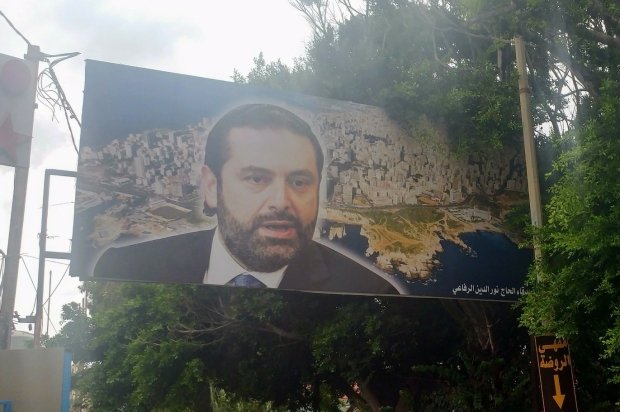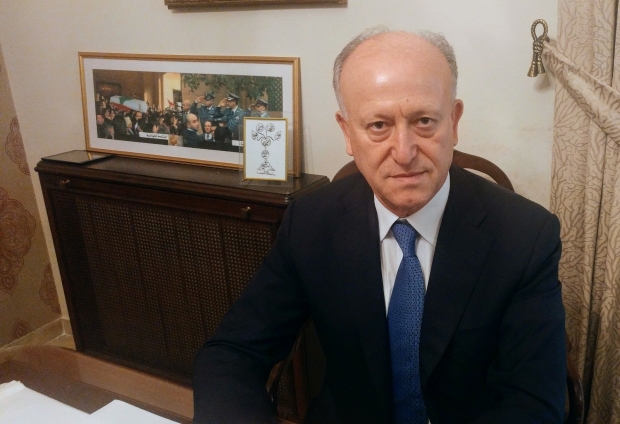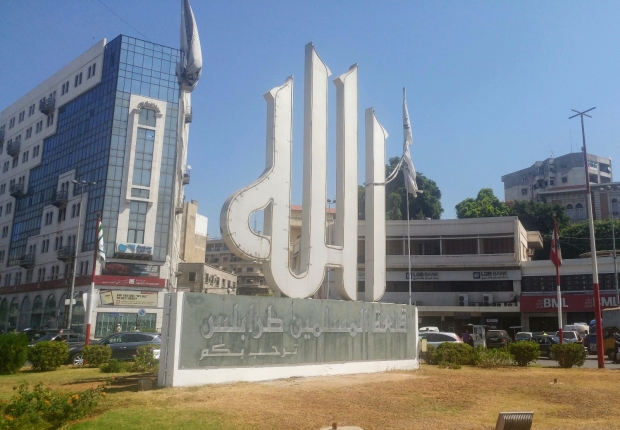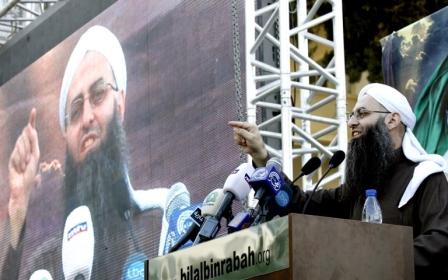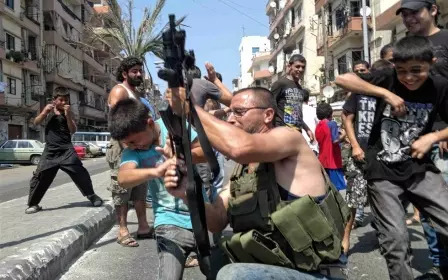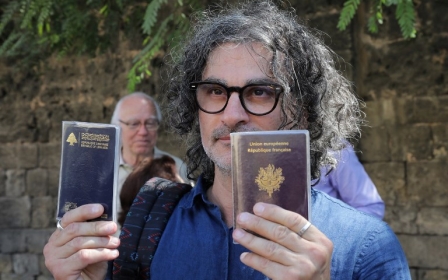'A feeling of defeat': Lebanon's Sunnis frustrated in face of Hezbollah power
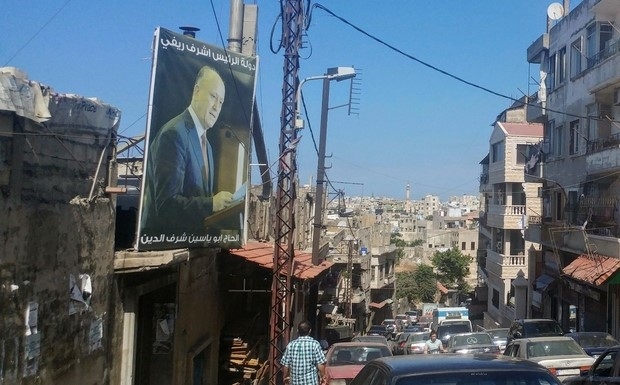
TRIPOLI, Lebanon - The present hegemony of Hezbollah, Lebanon's powerful Shia group, over local affairs in the absence of a political counter-force has left the country's Sunnis feeling weak and frustrated.
"There is a feeling of defeat," Mustapha Allouch, a former member of parliament, told Middle East Eye in reference to Lebanon's Sunnis, in spite of their numbers being roughly equal to Shia in the multi-religious country.
Iran-backed Hezbollah recently declared victory in Syria, and less than a year ago elevated ally Michel Aoun to Lebanon's presidency as it became a major regional player. It has been fighting alongside the Syrian government's international allies, including Russia, while maintaining border deterrence against the Israelis and threatening that the next confrontation may take place on their territory.
The main Sunni bloc, meanwhile, led by Prime Minister Saad Hariri, is experiencing financial and political crises amid cooling relations with backer Saudi Arabia.
In politics, you don't choose between right and wrong; you make the choice that is the least dangerous.
- Amer Helwani, Future Movement
Hariri did return to the premiership along with Aoun's ascension to the presidency last October, but it was only with Hezbollah's approval.
Hariri's first cabinet was toppled by the Shia movement in 2011, shortly before the start of the Syrian conflict, when Hezbollah and its allies withdrew their ministers from the government.
The prime minister dominated the Sunni vote in the last parliamentary elections, but that was in 2009. Observers and members of his own party say that Hariri is unlikely to retain his near monopoly over Sunni representation in next year's election.
Hariri, who inherited his father's Future Movement party after Rafic Hariri was assassinated in 2005, is no longer the unquestioned leader of Lebanon's Sunnis.
He has entered a grey region where hardliners say he compromises too much and Hezbollah views him as an arm of Iran's bitter enemies in Riyadh.
'Abnormal situation'
Ashraf Rifi, a former security chief and justice minister, deserted Hariri's camp because of what he calls its bending to Hezbollah's will. He says the Future Movement's outlook is defeatist.
Rifi is one of the emerging figures in the Sunni community who may threaten Hariri's leadership.
In Tripoli's 2016 city council elections, candidates backed by Rifi defeated Hariri's list, which was also supported by other local leaders, including former prime minister Najib Mikati.
Hezbollah, for its part, maintains that it is not looking to dominate Lebanon, and that it sent its fighters to Syria to protect the Lebanese people from the threat of "terrorism".
Rifi blames the Future Movement for the current "abnormal situation" in which Lebanon's Sunnis find themselves.
"They feel like the leadership has given up," Rifi told MEE from his house in the Achrafieh neighbourhood of Beirut.
"The leadership to whom they gave all of their trust and all of their votes did not rise to the proper level of responsibility. The leadership acted like it was defeated and pursued choices contrary to those of the community it represents."
Besides disappointing Sunnis in dealing with Hezbollah, Rifi said, Hariri's party has also failed to satisfy people's social and economic needs.
He added that the Future Movement satisfied its own needs in giving Hezbollah a president and a majority in the cabinet, hinting at Hariri's return as prime minister.
My alternative is the state, not a militia. I can't agree to bend under the premise that Hezbollah has arms
- Ashraf Rifi, former justice minister
Amer Helwani, a member of the Future Movement's political bureau, said Hariri had agreed to having Aoun as president because the other option was for the Lebanese state to crumble after more than two years of vacancy in the office of the presidency.
"In politics, you don't choose between right and wrong; you make the choice that is the least dangerous and least wrong," he told MEE.
Hariri is also the main leader of the Western- and Saudi-backed 14 March Movement, which was formed after his father's assassination in 2005 to demand Syria's withdrawal from Lebanon.
Syrian troops did exit Lebanon after a popular uprising that followed Hariri's death. Damascus had dominated Lebanese affairs since the end of its civil war in 1990.
Hariri's bloc was on the offensive after sweeping the elections that same year.
His allies called for disarming Hezbollah and successfully pushed for a tribunal and international investigation into the elder Hariri's death.
However, the alliance began crumbling as Hezbollah found an ally in Aoun, formerly a staunch opponent of the Syrian government.
On 7 May 2008, Hezbollah deployed armed men in Beirut to protest against a decision by the 14 March-led government to remove an internal phone network the group had set up.
The Sunnis' stance is that they are being targeted regionally, not only in Lebanon.
- Mustapha Allouch, a leader in Hariri's Future Movement
The militants brought life in the capital to a standstill and burned down Hariri's Future TV facility.
Hezbollah argued that the phone network was an essential part of its arsenal against Israel. Its chief, Hassan Nasrallah, vowed to "sever the hand" that reached for Hezbollah’s weapons.
Those events of 7 May changed the balance of power in Lebanon going forward.
Allouch, an outspoken leader within the Future Movement, said Hezbollah has had its way by using its weapons or threatening to use its weapons against political opponents.
Feeling like a minority
Allouch said that since the beginnings of Islam, Sunnis had been in power and considered themselves an integral part of the Islamic umma (nation), rather than a fringe community. But when the Ottoman Empire collapsed at the end of World War I, they were shocked by the loss of their centre of power in the world.
In Lebanon, Rafic Hariri's murder and Hezbollah's transformation into the country's strongest force has left Sunnis feeling like a minority and sharpened a sense of victimisation.
The war in Syria, Allouch said, has furthered that perception.
"Two years into the revolution, after all the massacres and Hezbollah's intervention, the Sunnis' stance is that they are being targeted regionally, not only in Lebanon," Allouch, a physician, told MEE from a hospital in the northern city of Tripoli.
He said Sunnis feel there is a global war against them involving the West, Russia and Iran.
Conspiracy theories about Tehran secretly working with Washington against Sunni Muslims have long fuelled anti-Iran and anti-Shia feelings in the region.
The frustration of Sunnis in Lebanon is also part of a wider feeling of repression since the demise of the Arab spring.
Victimisation
Allouch noted the double standards of the state in dealing with Lebanese people who fought in Syria.
Whereas Hezbollah has openly become a decisive force in the neighbouring country's civil war, Lebanese Sunnis who joined rebel forces have been detained and prosecuted, he said.
Since the beginning of the Syrian conflict, Lebanon has witnessed the rise of Sunni militant groups, including the emergence of Sheikh Ahmad al-Assir, who was sentenced to death on 28 September over deadly clashes with the Lebanese army.
Allouch said "militant extremism" only strengthens its counterparts, emphasising that Hariri did not encourage or approve of such groups.
"Our stance at the Future Movement has always been that extremism can only be treated with more moderation," he said.
Rifi also dismissed militant Sunni movements and figures, saying they do not represent the "moderate" community. He said "extremists" had been overrepresented among Sunnis because they filled the public squares, while moderates stayed at home.
Still, "bending is not being moderate; it's self-nullification," Rifi said.
Allouch warned that picking up arms against Hezbollah would not be effective.
According to Allouch, there are two possible solutions to Hezbollah's weapons: some sort of international agreement or the defeat of one side in a regional sectarian conflict.
"In either case, our role in Lebanon will not be influential unless there is arming and financing of Sunni groups in Lebanon," he said.
"In that case, we are heading towards civil war, which would be destructive for the entire country."
Allouch added that Hariri's Sunni opponents have raised the bar but have failed to provide any actual solutions.
Still, Rifi dismissed the notion that standing up to Hezbollah would lead to a civil war.
"My alternative is the state, not a militia, and I can't agree to bend under the premise that Hezbollah has arms," he said.
Abdul Ghani Imad, a sociology professor at Lebanese University, said the shifting balance of power, weakness of the state and unprecedented sectarian tensions have made Sunnis feel they are victims of injustice.
"Like all Lebanese people, they want justice; they want equality," Imad told MEE. "But given this inflammation of sectarian identities, they feel there is discrimination against them."
The Saudi role
Murmurs had been spreading around Tripoli that Qatar may be behind Rifi's political insurgency. The former security chief denies that he receives funds from Doha.
He said Lebanon's Sunnis still look to Saudi Arabia and the United Arab Emirates for regional leadership.
Standing by US President Donald Trump on the lawn of the White House in July, Hariri backed Kuwaiti mediation efforts in the Gulf crisis, calling for dialogue and refraining from criticising Doha.
Meanwhile, analysts say, amid Hezbollah's rise the Saudi kingdom seems to be changing its approach towards Lebanon.
While in the past Riyadh supported Hariri and his father before him as a Lebanese counterweight to Hezbollah, last year Saudi Arabia cancelled a $3b grant to the Lebanese army and warned its citizens against visiting the country.
It was a sign that the kingdom is moving away from participating in Lebanese affairs towards considering the country a hostile state within the Iranian orbit.
However, despite a receding Saudi role, Qatar has yet to gain a firm foothold in the Lebanese political landscape.
Imad, the sociology professor, admitted that Riyadh's relations with Hariri are confusing.
Saudi is now operating more as an observer than a player in Lebanon, without putting its weight behind Hariri, Imad said.
"Did they abandon him?" he asked. "Then who is their alternative ally?"
He cast doubt on Rifi as Riyadh's new man in Lebanon, saying the Future Movement remains the only Sunni party that enjoys widespread popularity.
Allouch lamented that Hariri's relations with Riyadh are not what they used to be, but he refused to criticise Saudi Arabia, adding that the kingdom has stood by Lebanon through hard times before.
New MEE newsletter: Jerusalem Dispatch
Sign up to get the latest insights and analysis on Israel-Palestine, alongside Turkey Unpacked and other MEE newsletters
Middle East Eye delivers independent and unrivalled coverage and analysis of the Middle East, North Africa and beyond. To learn more about republishing this content and the associated fees, please fill out this form. More about MEE can be found here.


